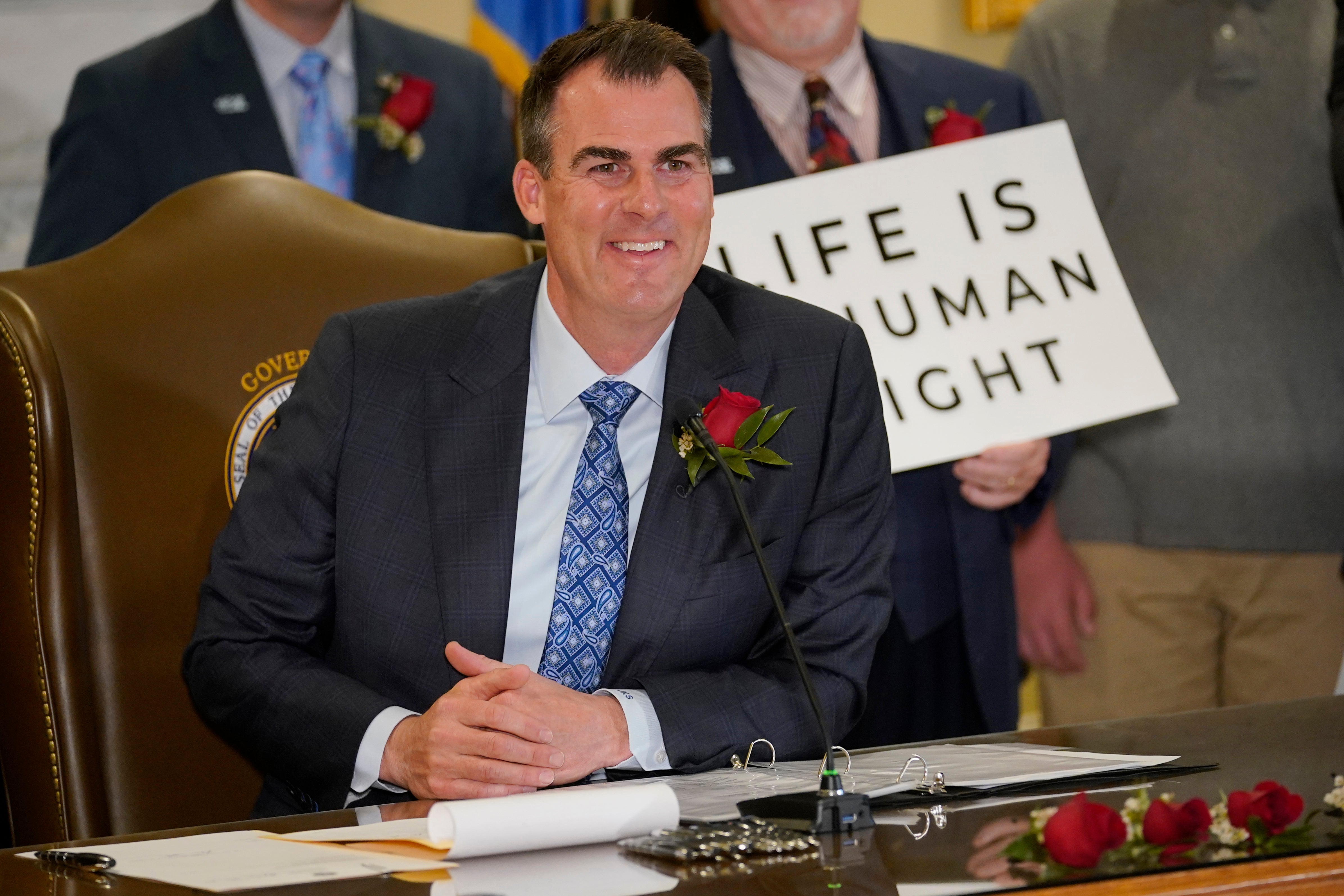Oklahoma’s abortion providers are ‘already living in a post-Roe world’
Abortion is still legal in every state, but physicians and advocates are bracing for the future of an over-burdened system that is failing to meet the needs of its patients, Alex Woodward reports


When Governor Kevin Stitt signed a bill into law making abortion care a felony in the state of Oklahoma, he vowed to “outlaw” the procedure entirely, pledging to sign any piece of legislation that reached his desk that promised to do just that.
A few weeks later, on 3 May, he signed a bill banning nearly all abortions at six weeks of pregnancy, before many women know they are pregnant. Like the Texas law it was modeled after, it empowers residents to sue anyone who “aids and abets” an abortion. There are no exceptions for rape and incest. The law went into effect immediately, effectively undercutting abortion rights overnight.
All of this happened while constitutional protections affirmed by the US Supreme Court’s landmark 1973 ruling in Roe v Wade were intact. But abortion providers in Oklahoma and across the US have known what was coming. Republican state legislators have introduced more than 200 bills to restrict access to abortion in 40 states within the first few months of 2022 alone, emboldened by the Supreme Court’s expected decision to eliminate abortion rights, ending reproductive healthcare protections for millions of Americans.
When Texas Governor Greg Abbott signed legislation outlawing abortion after six weeks of pregnancy last September, people seeking abortion found refuge across state likes in Oklahoma, where abortion providers field dozens of calls each hour for appointments.
Between September and December of 2021, Planned Parenthood centres in Oklahoma saw a nearly 2,500 per cent increase in abortion patients from Texas compared to same period in 2020.
“We are already living in a virtually post-Roe world in our region,” Dr Iman Alsaden, medical director for Planned Parenthood Great Plains, told reporters in a briefing. The organisation operates 11 facilities across four states, including three clinics in Oklahoma, and provides a range of services, from STI testing to cancer screenings and primary care. Five of its clinics offer abortion services.
If the Supreme Court overturns Roe v Wade, Oklahoma laws and laws in surrounding states and across the South would effectively outlaw abortion care, forcing patients to travel hundreds of miles to the nearest states where abortion access is protected at the state level.
Abortion providers have repeatedly stressed that abortion rights protections under Roe v Wade are still in place, and abortion remains legal and accessbile, while patients navigate a fragile system of care that Rebublican officials have gradually chipped away over decades.
“I don’t think it really is exaggerating to say we’re approaching the doomsday scenario. We’ve already been living with a crisis because of the Texas ban,” Planned Parenthood Great Plains interim president Emily Wales told The Independent.
To get to Oklahoma’s clinics, patients travel long distances, often overnight and without the support of friends or family, out of fear for their arrest or legal trouble with their help, according to Ms Wales. The drive from Tulsa to Denver, Chicago or Albuquerque, for example – in the nearest states for legal care – is nearly 24 hours roundtrip, not including overnight stays or days spent waiting for appointments. Providers in those states have warned they are not equipped to meet the demand for care if Roe falls.
“And we’re not meeting the need either,” Ms Wales said. “I don’t feel like we have to be quiet about that, because it’s a horrible situation to just have more people than we can get in our centres or appointments than we can schedule. But Oklahoma is a smaller state than Texas, and people are trying to stay close to home, and there just are not enough places for people to get care.”
The Center for Reproductive Rights and Planned Parenthood Federation of America, on behalf of abortion providers in the state, filed a lawsuit to block Oklahoma’s anti-abortion laws with the Oklahoma Supreme Court.
Without abortion access in Oklahoma, “the system that has been strained for too long, with too few providers, will break, and there will be more patients than ever,” Ms Wales said.

Dr Maya Bass travels from New Jersey to Oklahoma for several days every one or two months to provide abortion care at the Trust Women Foundation clinic in Oklahoma City, where she sees up to 40 patients each day.
“Patients come to me and tell me that they’ve driven six or more hours to get there, it took them weeks to get an appointment because of the volume increase, or just time for them to raise the money to travel and to find childcare,” Dr Bass told The Independent. “It’s a lot harder to be able to confirm appointments with people because [the clinic] can’t promise them that our clinic will be open next week.”
Trust Women operates facilities in Oklahoma and neighbouring Kansas, where abortions are legal up to 20 weeks of pregnancy. In August, Kansas voters will determine whether to reject an amendment to the state’s constitution saying that the state does not create or secure a right to abortion.
Complicating access to abortion care are the growing restrictions against medication abortions, by far the most common form of abortion care in the US. The pills can be purchased online and self-administered at home, and the Food and Drug Administration approved the medication by mail in 2021.
But at least 19 states, including Oklahoma, have blocked access to telehealth appointments for the prescription drugs. Many state laws still require patients to go through the same obstacles to get them – in-person appointments, waiting periods, long-distance travel – as they would for procedural abortions.
“We’re basically taking what should be a procedure that people can access in their communities and we’re making them have to jump through hurdle after hurdle after hurdle, just to get to our clinic,” according to Dr Bass. “Having people drive these distances and go through all these hoops, when we should be able to just do a video call with them and prescribe a medication – it’s just really frustrating to see how much they have to overcome just to come to see me.”

Governor Stitt has pledged to make Oklahoma “the most pro-life state” in the US, though abortion rights advocates have argued that the state has failed to care for people living in it.
Oklahoma ranks among states with the worst maternal death rates in the US, according to the US Centers for Disease Control and Prevention and state Department of Health. Between 2017-2019, the state’s maternal mortality rate was 23.5 maternal deaths per 100,000 live births.
The Independent has requested comment from the governor’s office and asked how the state will support residents who are not able to receive an abortion.
“These laws are being created by people who have no medical expertise. They’re not being created with patient safety or medical outcomes in mind, they’re entirely created to control bodies,” Dr Bass told The Independent. “The people who are affected by these laws are already being underserved by our system, are people of color, and … it’s just very hard to have a politician come into my patient room to make the decision that is really something that should be entirely based on what my patient’s life is and what their decision is, and just guided by my medical expertise, and that’s the only two people that should be involved in that decision. Not a politician.”
Abortion providers and abortion rights advocates across the US, preparing for a likely Supreme Court ruling on Roe v Wade and its affirming ruling in 1992 in Casey v Planned Parenthood, are preparing for its fallout – how to perform telehealth visits for patients across state lines, building support for abortion fund groups to assist people traveling for care, and bolstering already-stressed clinics in states preparing for an influx of patients.
“This [Supreme Court’s] decision is not about patients, it’s not about lives, it’s about controlling people’s bodies and futures,” according to Dr Bass. “The organizations that have been working towards abortion access for years have known that this is a possibility, and that we are working on fighting … and if people want to get involved in the fight, to look to organizations that have been doing the work, join and support them, so that we can do our best to get access to abortion care for everybody who needs it.”
Join our commenting forum
Join thought-provoking conversations, follow other Independent readers and see their replies
Comments



Bookmark popover
Removed from bookmarks